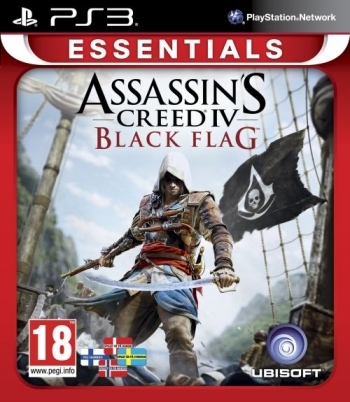

While previous installments relied on the game's built-in auto aim, in Assassin's Creed IV: Black Flag, players are able to just aim and fire, similar to third-person shooters.ĭual-wielding weapons has also been implemented, with Edward being able to carry four flintlock pistols and be able to use them all together, chaining up to four gunshots into a combo of attacks to take down more enemies. Aside from the pistols and his Hidden Blades, Edward can equip dual cutlass swords and chain their attacks together.
#Playstation 3 assassins creed 4 free
Synchronizing with a viewpoint unlocks more loot and area of "interest" to Edward and can also be used as a faster way of locating a specific target.īlack Flag 's combat has been upgraded to include free aiming.

Furthermore, they now also serve the function of fast-travel locations. As in the previous games, viewpoints have to be synchronized so as to reveal information about an area and its surroundings. The game aims to blend between its land and aquatic experiences seamlessly, to the point where players can simply dive off Edward's ship, swim to the shore and explore the land, as well as dive under the surface to loot underwater ship wrecks. Other activities include hunting, harpooning, and exploring underwater environments. Furthermore, there are around 75 beaches and sandbanks, which can hold various treasures and marooned sailors to add to Edward's crew. The score was instead composed by Brian Tyler, the composer of Far Cry 3.Ībout 60% of the game takes place on land players can explore 50 locations ranging from fisherman villages, plantations, jungles, forts, islands, Templar hideouts, Maya ruins and exotic Coconut Islands. Lorne Balfe, who was the sole composer for Assassin's Creed III and secondary composer for Assassin's Creed: Brotherhood and Assassin's Creed: Revelations, did not return to score the soundtrack for Assassin's Creed IV: Black Flag. Republic author Colin Woodard was invited to consult on the game. As a homage to the former book, the game's subtitles rendered each noun with capital letters. McDevitt stated the game's primary history resources were A General History of the Pyrates (1724) and The Republic of Pirates (2008).

He considered beginning the story with Edward as a boy during William Kidd and Henry Morgan's era of piracy, but decided he felt skeptical as to whether Assassin's Creed II convincingly portrayed a similar span of time, and so opted to simply focus on the Blackbeard era towards the end of the Golden Age of Piracy. Writer Darby McDevitt began writing the game soon after completing Assassin's Creed: Revelations, after being suggested to do a game expanding the "Kenway family saga", instead of Connor's life story as they did with Ezio Auditore. Ubisoft's Montreal-based team, in conjunction with 7 other studios from Singapore, Sofia, Annecy, Kiev, Quebec City, Bucharest and Montpellier – accompanied by a band of developers of Far Cry 3 – contributed to the completion of the game, with each studio focusing on different elements.

The pair also explained that because the game was so radically different from its predecessor and that the scope and open-world gameplay was so different from the previous game, they opted for the project to be a numbered sequel as opposed to a spin-off that followed in the footsteps of the last numbered game, Assassin's Creed III. Ismail also stressed that they aimed towards a more historically accurate take on the era, including staying away from the stereotypical image associated with pirates, such as parrots, Krakens, and plank-walking. Assassin's Creed IV: Black Flag producer Martin Schelling and Mission Director Ashraf Ismail both stated that they began the project in the summer of 2011, with a pirate game as their focus.


 0 kommentar(er)
0 kommentar(er)
